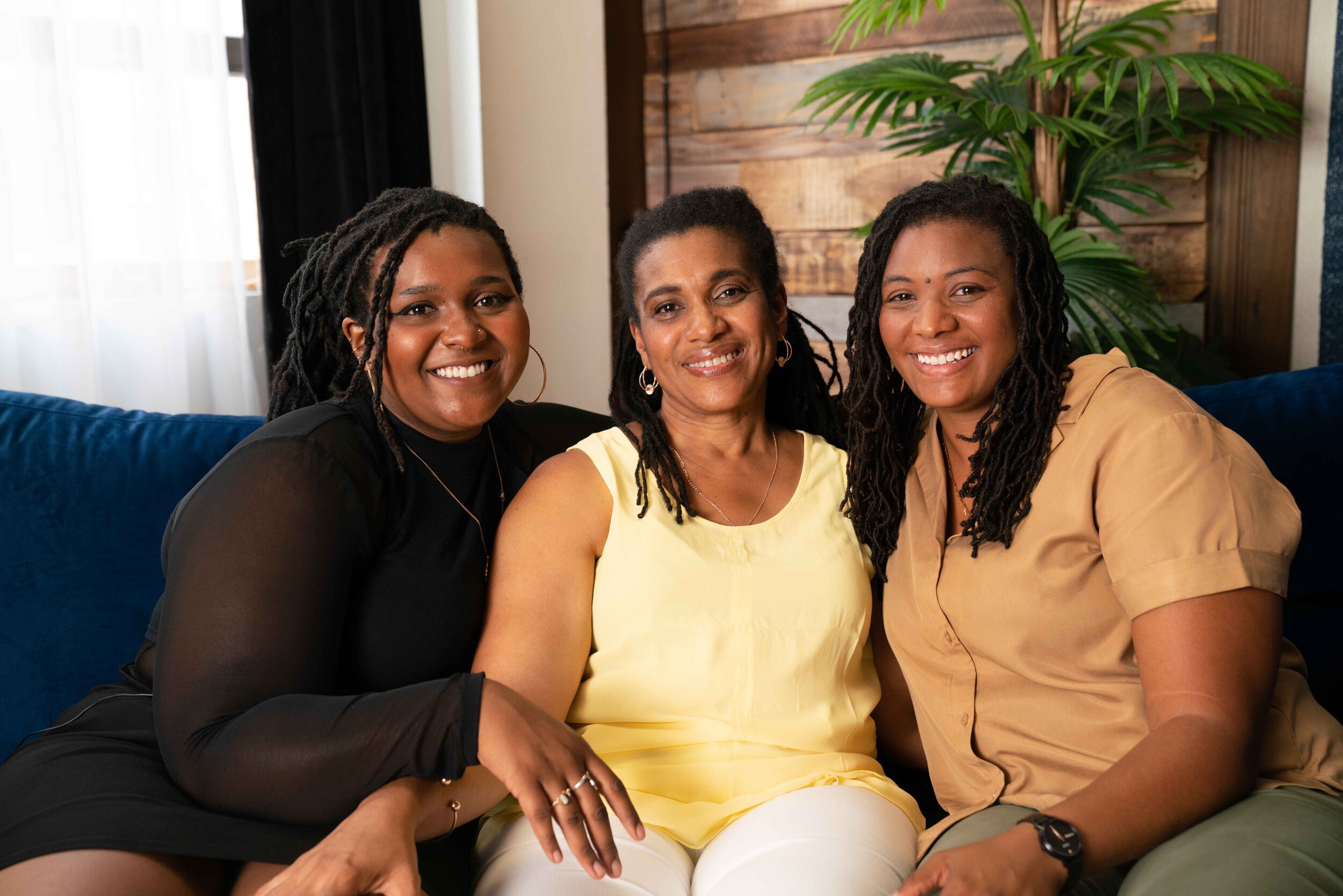
UNCONDITIONAL LOVE
An online educational resource to help families better navigate the coming out process by providing information, tips, and additional resources.
Studies show that family support can make a critical difference in the well-being of 2SLGBTQ+ youth. That is why we made "Unconditional Love".
On this page, you will find videos containing stories, tips, and resources, shared with us by five diverse families. We've put the stories section first, so you can get to know each family's journey, followed by videos of our 5 key tips: prepare, listen, affirm, educate, and support. The last section of this page contains additional resources, for continued learning and support.
We are all at different stages of learning, and come from different lived experiences, and every family is unique. But at the same time, so many of us have learnings to share, from going through this process ourselves; stories of support, of growing together, and the things that helped that process along the way.
Austin and his parents, Diana and Michael, share their story. They touch on coming out twice, the importance of research, education and advocacy for your child, and the value of supporting, even if you do not fully understand.
Sylvia and her mom, Karina, share their journey living in a single parent household and how their openness to talk about mental health since a young age made Sylvia’s coming out process a little bit easier. Their story touches on coming out to conservative grandparents, the impact religion had on their journey, and the power of genuinely supporting and accepting your child.
D’Andrew and his mom Maxine share the struggle of coming out twice in a religious and Caribbean household, and a parent’s journey of choosing learning and acceptance over having their child go through his transition alone.
Jonas and his brother Jesse share their family’s journey of self acceptance, grief, the importance of normality and balancing multiple family struggles while transitioning. Also growing up in a single parent household, they recount how education and love helped solidify a foundation of family support during Jonas’ transition.
Courtney, her sister Zakirah, and their mom Cheryl share their coming out journey while living in a large single parent household. Their intersectional story touches on their experience being Black and being a part of the 2SLGBTQ+ community, the power of growing up in an accepting household from a young age, and not letting the opinions of others dictate the support parents should give their child.
It’s important for us to note that the term “family” can mean many different things, and looks unique to everyone! We are using the word to encompass any situation where a guardian or caregiver is looking out for the wellbeing of someone coming out. We often use the word “child” in this resource, but you could use this tool to support a sibling, close friend, family member or anyone else!
Preparing for someone coming out doesn’t mean that you’re guessing your child’s identity before they’ve told you. Preparing simply means building an inclusive and safer environment for everyone, whether or not your child has, or will come out. Not only will this make your child feel safer if they do come out, but it will teach them amazing habits and language to help them be an ally to 2SLGBTQ+ folks, regardless.
Some ways that you can foster an inclusive household are:
Try to use inclusive, gender neutral language.
Being mindful to not use, and to speak out against derogatory slurs, stereotypes, and misinformation about the 2SLGBTQ+ community.
Read books, and watch movies and television shows with inclusive themes, and diverse characters and subjects.
Inform yourself & your kids about 2SLGBTQ+ History, & prominent figures.
Go to places where you and your child will be exposed to diverse people.
Have open communication with your child about supporting them no matter what.
Make your acceptance visible and heard - children learn a lot from their parents so teaching your children to be respectful of people in the community will allow them to see that your home is a safe place for them or their friends!
“It’s more the language you use around them. Even before your child comes out - watch the things you say, and the content that is shown to them.”
- D’Andrew
Learning how to listen without thinking of what to say next or necessarily giving advice is a skill we can all practice. It’s especially important when your child is figuring out or telling you about their identity - you can’t tell them how they should identify; they have to discover it on their own!
To let your child know they can talk to you, try:
Telling them from a young age they can come to you about anything.
Allowing them to come to you on their own time. For example, instead of persistently asking questions like “Are you gay?”, give them time to figure it out. They might not know yet themselves!
Instead, you can say something like, “You know I love you and you can talk to me about whatever you need,” and leave it there.
Being honest when you don’t know or need time to process information and asking for that.
“Ultimately, when your child comes out, whatever they’re coming out or identifying as, believe them. Regardless of how old they are, or what they’re talking about. Give your child the support, give your child the love, respect what your child has to say, and set your child up to be able to live in this world, regardless of who they are.”
- Michael and Diana,
Austin’s parents.
The way you respond to your child coming out can have a huge impact on their well-being, so making sure to clearly affirm your support, while being mindful of their feelings and how difficult it could have been for them to tell you, is very important.
Here are a few tips on ways you can validate your child during the coming out process:
Tell them you love them.
Ask them how you can support them and try to follow their suggestions.
Avoid asking questions like “Do you think this is just a phase?” Instead, respect what your child is saying, and their opinions.
Ask respectful questions.
Don’t be afraid to talk with your child about their 2SLGBTQ+ identity. Casual conversations can help normalize things, and avoid feelings of discomfort.
Look for resources to educate yourself and follow up with your child to check you’re on the right track.
“There is no guide book on the perfect thing to say because it is relative to you what each kid needs. For me, my biggest point of advice would just be to pinpoint what their nerves are - whether it’s fear of acceptance, fear of being judged or fear of a change - there’s all these things that people are scared of. So if they’re dealing with shame, for example, it could be just saying something like, I love you, just the same.”
- Sylvia
The more you understand, the less likely you will be to say or do something harmful, or rely on your children to educate you! And, as many studies have shown, your support is critical!
If you’re looking for some places to start, consider checking out some of the trustworthy resources linked below:
There are so many things you can learn about, but try not to get overwhelmed! You don’t need to be perfect - we learn from our mistakes just as much as we can learn from a book, movie or podcast.
“Trans youth who indicated their parents were strongly supportive of their gender identity and expression were significantly more likely (72%) to report being satisfied with their lives than those with parents who were not strongly supportive (33%).”
- Trans PULSE Project
Support comes in so many different shapes and sizes, but ultimately, it means you’re doing your best to be there for someone you love.
For someone coming out, support might look like:
Going to support groups and/or therapy together.
Using their chosen name and helping others do the same (as long you’ve been given permission to do so).
Respecting their pronouns (even if they change) is important and validating.
Helping them find resources in the area.
Advocating for your loved one, especially when they are young, is very important in their journey. This could mean making sure their rights and needs are being respected, i.e at school, in the healthcare system, legally.
Not sure where to start or how you’re doing? Try asking! “How can I support you?” or, “Hey! I just wanted to check in: how am I doing? What could I be doing better?”
“The intent matters so much. I think intentionally misgendering someone or intentionally not using someone’s pronoun is a lot more damaging than someone who loves you and is trying their best.”
- Jesse, Jonas’ brother
Download the Unconditional Love PDF which includes 5 key tips and additional resources for both families and youth.
“There is more of a responsibility on the parents especially if you have a young child to go out there and find the resources, find the community, find the books, find the shows that are inclusive and have representation.”
- Courtney
None of this would have been possible without our sponsors. From the bottom of our hearts, thank you to the Pride Run, to Birks, and to the Kiwanis Foundation for giving us the ability to create this very important resource. We appreciate your support for the 2SLGBTQ+ community.




































![Birks Bijoux Wordmark_Black[1] (1).png](https://images.squarespace-cdn.com/content/v1/60f5820fc02a467563605db4/1633486792638-ED82FERZ5TSWAGEWJ0MU/Birks+Bijoux+Wordmark_Black%5B1%5D+%281%29.png)